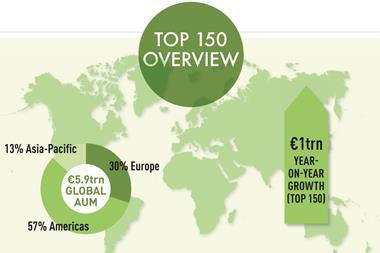The surprise merger of Swiss banks UBS and Credit Suisse could create the fifth-largest real estate investment management business in the world.
UBS Asset Management was ranked 15th in IPE Real Assets’s most recent Top 150 Real Estate Investment Managers report, with €93.7bn in assets under management (AUM), while Credit Suisse Asset Management came in 30th with €59.3bn AUM.
Based on these numbers, a consolidation of the two businesses would place them fifth with around €153bn, just below PGIM Real Estate and above Nuveen Real Estate.
Both UBS AM and Credit Suisse AM declined to comment on what the merger would for the real estate businesses.
One real estate fund manager said it was too early “to draw strong conclusions on what a combined real estate platform may look like”. But he added: “Suffice to say, both businesses have significant real estate positions and the combined scale will afford privileged access to private real estate markets and there may be admin/management synergies. That said, there is also significant overlap in both firms’ offers.”
While Credit Suisse AM has less than two-thirds in real estate AUM compared with UBS AM, its €52.1bn European real estate portfolio was greater in value last year to UBS AM’s €46.5bn portfolio, according to IPE Research.
UBS AM had greater exposure to the Americas (€40.7bn versus €5.33bn) and Asia-Pacific (€6.4bn versus €1.91bn) than Credit Suisse AM.
Last month, Credit Suisse AM made a large real estate acquisition in Florida and last year the firm hired Rob Rackind as global head of real estate. Rackind was previously a partner and global head of EQT’s real estate business.
Another real estate fund manager said: “In my opinion, both firms have a fully functional and profitable real estate asset management business, both in Switzerland and abroad. Given the nature of real estate asset management, there is little synergies in a merger as it is difficult to scale.”
But, he added, the merger “creates for the organisation more opportunities than risks, I think”.
One real estate adviser said it will be difficult to predict how the merger plays out for the two real estate investment managers, particularly in regard to the respective leaderships.
“As the dust settles and people get their heads around what they’ve got at UBS, they will make some decisions on merging teams and what makes most sense,” he said.
“They will say business as usual”, but all major decision at both firms will be put on hold for the foreseeable future, he added.
The unexpected nature of the takeover of Credit Suisse and the ongoing banking crisis has added to the uncertainty in real estate markets, as highlighted during last week’s MIPIM trade fair.
“It’s been a sombre couple of days in Zurich,” said Andrew Angeli, global head of real estate research and strategy. “Credit Suisse is part of the national psyche and the emotional toll has been real.
“The evolving situation will likely foster weaker investor sentiment, at a time of already heightened caution – my key takeaway from MIPIM. I expect potential job cuts, local nervousness and increased sub-let space to weigh on the Swiss office market near term. Fortunately, it’s starting from an enviable position.”
Angeli said: “Experience suggests that when managers merge or are acquired they are put in the penalty box by investors for a period of time. This may present a unique window for competing organisations, like ours, to win new clients and attract talent.
“That said, another MIPIM takeaway is that 2023 is likely to be a quiet year for capital raising and deployment. So, timing may actually be advantageous.”
To read the latest edition of the latest IPE Real Assets magazine click here.
























